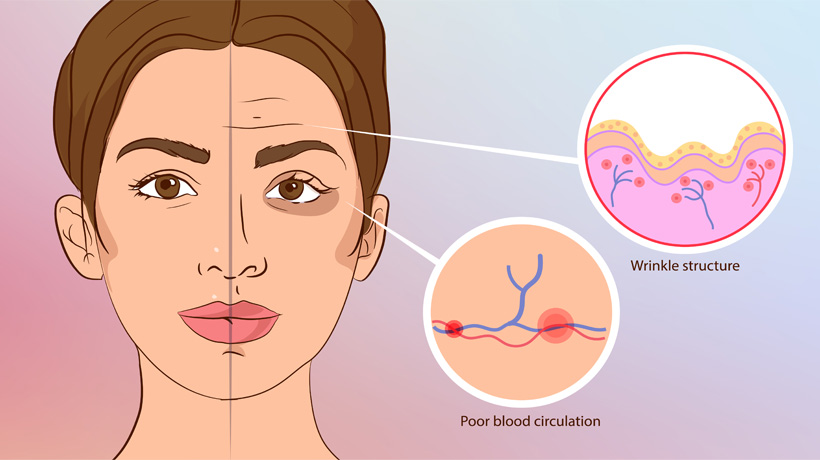They say time heals all wounds. But with time comes age, and with age comes aging. So maybe time isn’t that great of a friend after all. In all seriousness, aging is a topic that will be on almost everyone’s minds at some point. And with the prevalence of anti-aging or wrinkle creams and treatments today, people are trying to combat aging before it even truly begins.
Well, before you go pick up that new $100 eye crease rejuvenating cream, you may want to reexamine your daily habits. Odds are the things you do every day without a second thought are contributing to your aging process. Here are seven harmful habits that could be aging you.
You’re a multi-tasker
While this is a great bullet for a resumé, it’s not so great for your body. While multitasking makes it seem like you’re getting more done, it’s really just creating more stress. Studies show that chronic stress increases the body’s production of free radicals, or unstable molecules that damage cells and cause aging. Try taking a breather and doing one thing at a time.
You’ve got a sweet tooth
We get it. Those cookies from the kiosk in the mall do smell delicious, and we can’t blame you for taking a couple (or a dozen) home for later. But in addition to adding weight to your body, those sweet little treats can add years to your face. Sugar molecules attach themselves to protein fibers in our cells, causing the damaging process referred to as glycation. This can result in a loss of radiance, dark under eye circles, loss of tone, puffiness, an increase in fine lines, wrinkles, or pore size, and a loss of facial contours. Yikes.
You don’t sleep well
Netflix has changed the game by allowing all episodes of their series to be released at once, and many of us are paying the price with sleepless nights spent binge watching their latest original. But getting an inadequate amount of sleep each night not only causes dark bags, but it’s also been linked to a shorter lifespan. In addition, sleep deprivation symptoms include a lack of daytime energy, mental sluggishness, attention problems, or weight gain. To avoid these side effects, try aiming for at least seven hours of sleep per night.
You spend most of the day sitting
If you work in an office, you probably spend most of your day sitting at your desk. If you can’t manage to make it to the gym or fit in a walk at some point during the day, you may be putting yourself at risk. A sedentary lifestyle has been linked to increased risk for kidney disease, cardiovascular disease, obesity, and cancer. Exercising regularly helps you cut down your risk and live longer, according to a study from the British Journal of Sports Medicine. Study participants who exercised 150 minutes or more a week lived 10 to 13 years longer than those who were mostly inactive.
You don’t use sunscreen often enough
Many believe they only need to apply sunscreen before a day at the beach. But actually, you should be applying it every day (and yes, that means winter too!). Simply running errands, walking the dog, or grabbing the mail puts you at risk for sun damage if you’re not wearing sunscreen. The number one cause for premature aging and wrinkling is ultraviolet exposure, which can be prevented with a quick slather of SPF 30.
You wear too much makeup
Yes, I know. You thought makeup was supposed to help you look younger! Oh, the betrayal. Wearing excessive amounts of makeup, especially if it’s oil-based, can clog pores and cause breakouts. In addition, daily use of products with fragrances, irritating chemicals, or alcohol agents may dry out your skin and remove its natural oils. This causes – you guessed it – premature aging and wrinkles.
You sleep with your face pressed in the pillow
Many of us are guilty of this one. After all, when all you’re thinking about is catching up on some sweet z’s, how can you be concerned with the positioning of your face on your pillow? Apparently, we should all be a little more aware. Sleeping on your stomach or side with your face smashed cozily into your pillow can actually cause wrinkles and accelerate aging. This is especially true if you sleep on the same side of your face each night, since the collagen and connective tissue in your face get weaker with age, making your face less likely to snap back into place like it did before.
Sources:
https://www.ncbi.nlm.nih.gov/pmc/articles/PMC4310835/
https://bmcneurosci.biomedcentral.com/articles/10.1186/1471-2202-11-56
https://www.beaumont.org/health-wellness/blogs/why-sunscreen-is-just-as-important-in-the-winter
https://www.prnewswire.com/news-releases/study-shows-stomach-and-side-sleeping-positions-cause-facial-distortion-and-wrinkles-over-time-300303981.html
https://www.health.com/health/gallery/0,,20788790,00.html?slide=68523#68523



